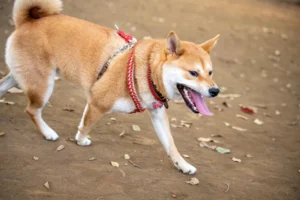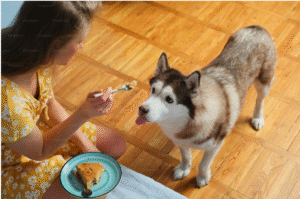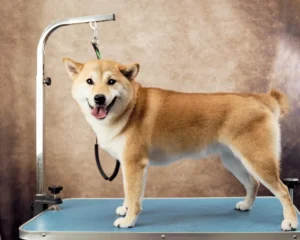
Shiba Inu
History of Shiba Inu
The Shiba Inu is one of Japan’s oldest and most beloved dog breeds, dating back over 3,000 years. Originally bred for hunting small game like birds and rabbits in Japan’s mountainous regions, Shibas were prized for their agility, independence, and keen senses. The name “Shiba” means “brushwood” in Japanese, referencing the terrain where they hunted or the reddish brushwood color of their coat.
By the early 20th century, the breed was nearly lost due to war and disease, but efforts to preserve and standardize the Shiba began in the 1920s. After World War II, breeding programs helped revive the breed. Today, the Shiba Inu is the most popular companion dog in Japan and has also gained a strong following worldwide for its fox-like looks and spirited personality.
- Weight: Shiba Inus usually weigh between 17-23 pounds (8-10 kg).
- Height: They stand about 13.5 to 16.5 inches (34 to 42 cm) tall at the shoulder.
- Length: The body length is typically proportional to their height, with a sturdy and compact build.
- Lifespan: Shiba Inus have a lifespan of approximately 12-15 years.
- Coats: They have a thick double coat that requires regular grooming, especially during shedding seasons.
- Colors: Common coat colors include red, sesame (red with black-tipped hairs), black and tan, and cream.
Height
Weight
Lifespan
Shiba Inu Dog Appearance: What They Look Like
Shiba Inus are compact, agile dogs with a bold and fox-like appearance. They have a curled tail that rests over their back, pointed ears, and bright, almond-shaped eyes that give them an alert and confident expression. Their double coat is thick and plush, with a soft undercoat and a straight, stiff outer coat that helps protect them in cold weather. The most common coat color is red, but Shibas also come in sesame (red with black-tipped hairs), black and tan, and cream. Their well-proportioned body is muscular yet nimble, built for speed and quick movements. Though small in size, the Shiba Inu carries itself with a dignity and presence far bigger than its frame suggests.

Shiba Inu Behavior and Temperament
Shiba Inus are known for their spirited, confident, and independent nature. They exhibit a strong personality and can sometimes be stubborn, which may challenge novice dog owners. However, they are also loyal and affectionate with their families.
They can be reserved around strangers but are generally good with children and other pets when properly socialized. Shiba Inus are intelligent dogs that require mental stimulation and physical exercise to prevent boredom and destructive behavior. Their hunting instincts may lead them to chase smaller animals, so supervision is essential when they are outdoors.
Intelligence and Trainability of Shiba Inu
Shiba Inus are intelligent dogs but can be quite independent and headstrong, making training a challenge. They respond best to positive reinforcement techniques, such as treats and praise. Consistency and patience are crucial in training sessions.

Early socialization is important to help them become well-adjusted adults. Despite their independent streak, many Shiba Inus excel in obedience, agility, and other dog sports. Engaging their minds through training games and interactive toys can also help keep them mentally stimulated.
Ideal Living Environment of Shibas
Shiba Inus adapt well to various living situations, including apartments, as long as they get regular exercise. A secure yard is a plus—they love to explore, but their strong prey drive and tendency to bolt mean they should always be in a fenced area or on a leash. Shibas thrive in homes where they are given both mental and physical stimulation, as well as clear boundaries.
They prefer a calm environment and do well with experienced dog owners who understand their unique temperament. Though they enjoy companionship, they also appreciate their alone time and may not be ideal for someone seeking a clingy or cuddly pet.
Shiba Inu Health Considerations
While Shiba Inus are generally healthy, they can be prone to certain health issues, including:
Allergies: Skin and food allergies are fairly common and may require dietary management or medication.
Hip Dysplasia: Though less common in Shibas than in larger breeds, it can still occur and may affect mobility in older age.
Patellar Luxation: A condition where the kneecap slips out of place, often seen in small breeds.
Glaucoma and Cataracts: Eye issues may develop later in life and should be monitored with regular vet checkups.
Periodontal Disease: Due to their smaller mouths, Shibas are prone to dental issues—regular brushing and dental care are essential.
Are Shiba Inus good family pets?
Yes, they can be, but they’re best suited for experienced dog owners. They’re loyal and clean but also independent and strong-willed, requiring consistent training and socialization.
Do Shiba Inus shed a lot?
Yes, they shed heavily twice a year (a period known as “blowing coat”) and moderately throughout the year. Regular brushing helps manage the shedding.
Are Shiba Inus easy to train?
Shibas are smart but persistent. Positive reinforcement is crucial for early training because they might not always follow instructions. For first-time dog owners looking for a companion who is eager to please, they are not the best option.
Can Shiba Inus live with other pets?
They can, but careful early socialization is key. Shibas tend to have a high prey drive, so they may not get along with small animals or same-sex dogs.
Do Shiba Inus bark a lot?
They don’t bark excessively but are known for their unique “Shiba scream” — a loud, high-pitched vocalization when they’re unhappy or overly excited.



